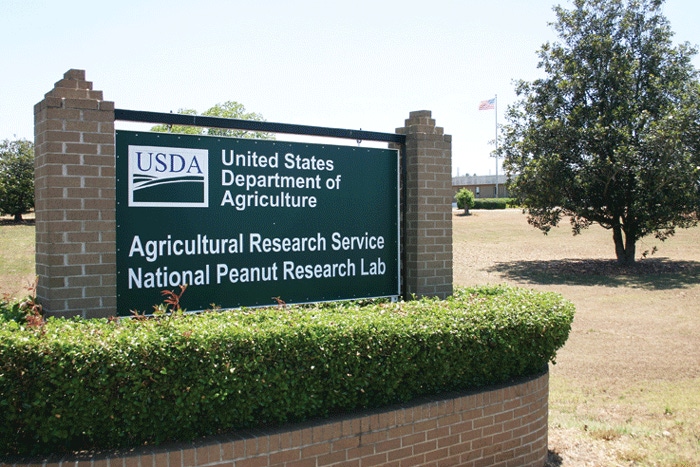
• As a result of Congress eliminating earmarked funds associated with water-use reduction, the budget at the National Peanut Lab has been cut by approximately 20 percent.• These reductions have eliminated four scientific positions, including two agronomists, one peanut geneticist and one plant physiologist, in addition to numerous support technicians and student workers.
June 17, 2011

The USDA/ARS National Peanut Research Laboratory in Dawson, Ga. — located in the heart of the state’s peanut belt — could see a significant portion of its work halted due to budget cuts at the federal level.
As a result of Congress eliminating earmarked funds associated with water-use reduction, the budget at the National Peanut Lab has been cut by approximately 20 percent. These reductions have eliminated four scientific positions, including two agronomists, one peanut geneticist and one plant physiologist, in addition to numerous support technicians and student workers.
The scientists affected by the budget reduction include Wilson Faircloth and Russell Nuti (agronomists), Charles Chen (breeder and geneticist), and Ling Zhang (plant physiologist).
Prior to the cutbacks, there were 12 scientists on staff at the peanut lab.
According to Research Director Marshall Lamb, The National Peanut Research Laboratory conducts research on water and energy conservation, food safety, bioenergy, peanut production, and post-harvest handling research.
The overall goals of the research, he says, are to conserve natural resources through improved irrigation scheduling and conservation methods, develop sustainable bioenergy alternatives (biodiesel), develop peanut cultivars with improved drought and pest tolerance, improve handling efficiency, and develop new methods to reduce aflatoxin contamination in peanuts.
“Over the years, research conducted at the lab has directly addressed major issues confronting the peanut farmer, handler, sheller, manufacturer and ultimately the U.S. consumer by developing technology to improve profitability and quality through research on breeding, curing, cleaning, mycotoxins, storing, shelling, and marketing peanuts and by developing production and marketing systems to reduce cost, enhance use of peanuts, and insure a safe consumer product,” says Lamb.
Research critical to peanut industry
Each of the lab’s research projects is aimed at maintaining and enhancing the viability of the United States peanut industry, says Lamb, who also serves as the advisor for the Farm Press Peanut Profitability Awards Program.
The result of the staff reduction is that several significant industry-supported research efforts will be terminated.
A partial list of the potentially terminated projects related to water use reduction, irrigation and water-use efficiency includes:
• Cultivar development with improved drought and disease tolerance.
• Cultivar development with high oil and folic acid contents.
• Expand genomic resources for drought tolerance in peanuts.
• Identify and clone peanut genes involved in drought protection.
• Screen gene collections for drought resistance.
• Primed acclimation strategies to reduce irrigation requirements in peanuts.
• Improved irrigation scheduling decision support systems.
• Conservation-tillage cropping systems to reduce water requirements.
• Field instrument for non-destructive measurement of water content in plants.
• Physiological responses of peanuts to drought stress.
• Germplasm evaluation for physiological traits suitable for drought stress.
• Plant stress indicators via leaf temperature and CO2-based sensors.
• Optimizing production of peanut biodiesel for on-farm use.
• Water conservation in peanuts, corn and cotton with furrow diking.
• Peanut peg strength and digging loss research.
• Improved, more precise peanut maturity prediction methods.
• Soil and plant responses to rates of BIOCHAR application in peanuts, corn and cotton.
• Valencia and Spanish row spacings in west Texas and New Mexico.
• Improved crop replant decisions.
• Nematicidal properties of oilseed radish on peanut root-knot nematodes.
The reduction in staff also could potentially terminate the following projects at the peanut lab:
• Removal, treatment and planting of peanut embryos to reduce cost of production.
• Handling and processing of peanut biodiesel for on-farm use.
• Milling and seed quality of newly released peanut cultivars.
• Water use efficiency with peanut, corn and cotton with drip irrigation.
• Yield response of cotton, corn and peanut to drip irrigation length and tube diameter.
• Efficacy of pesticide applications through drip irrigation in peanuts, corn and cotton.
• Palmer amaranth control in conservation-tillage cropping systems.
• New technologies for genetic modification of peanuts.
• RNA interference to reduce aflatoxin contamination in peanuts.
• Phytoalexin identification and quantification for peanut breeding program.
About the Author(s)
You May Also Like



